By John Helmer, Moscow
The Russian government this week fired a new shot across the bows of New Zealand, one of the Obama Administration’s staunchest allies in the Pacific and on the Ukraine and Syrian warfronts.
Starting on Monday next, February 6, imports of New Zealand beef will be banned by the Russian Service for Veterinary and Phytosanitary Surveillance (Rosselkhoznadzor, RSN). The results of testing by RSN confirmed “numerous identifications of bacteria of the Listeria monocytogenes type.” In addition, traces of the prohibited hormone growth additive ractopamine had been detected in NZ beef offal. Accordingly, RSN said, it was commencing “temporary restrictions on deliveries to Russia of beef and beef offal from New Zealand”; the offal is a common ingredient in Russian sausage manufacture. The announcement from RSN added: “Rosselkhoznadzor also considers the possibility of entering of temporary restrictions on import from New Zealand to Russia of fish products, in connection with numerous identifications in consignments of New Zealand fish of bacteria of Listeria monocytogenes type, and higher than admissible levels of mercury.”
NZ lamb and mutton exports to Russia have not been mentioned by RSN, and are not affected for the time being.
The threatened ban on NZ fish is not new. The threat was first announced last October 5, days after the NZ prime minister at the time, John Key, issued a public insult to President Vladimir Putin, and attacked Russian policy in the Ukraine and Syria. Read the full story here.
Weeks later, on December 4 Key announced his surprise retirement. NZ press reports claimed that Key’s wife had forced the move, not Putin.
Key’s successor, Bill English, has reshuffled his cabinet but left anti-Russian foreign minister Murray McCully in place. Putin sent routine congratulations. English, who had been deputy prime minister and finance minister in Key’s cabinet, was last in Moscow in 2012. A year on, in 2013, English attacked the public housing programme of the rival NZ Labor Party by saying it “will make us look like the back-end of Moscow.”
Since 2013 the value of imported meat has dropped by more than half – from $7.4 billion in 2012 to $3.1 billion in 2015.
THE FALL IN RUSSIAN MEAT IMPORTS, 2010-2015
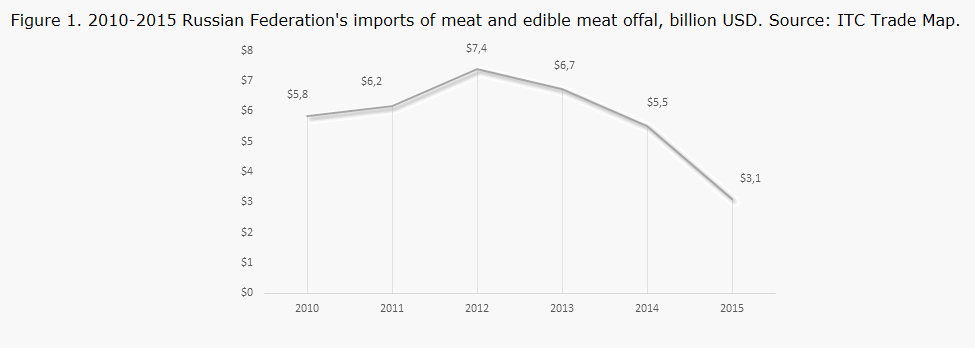
Source: http://www.rusexporter.com/research/industry/detail/4910/?sphrase_id=9602
The shares of the shrinking import market of the major foreign meat exporting countries have remained relatively stable, except for Ukraine and Colombia. NZ is (was until now) 11th on a table of 17 countries.
TOP EXPORTERS OF MEAT TO RUSSIA, 2014-2015
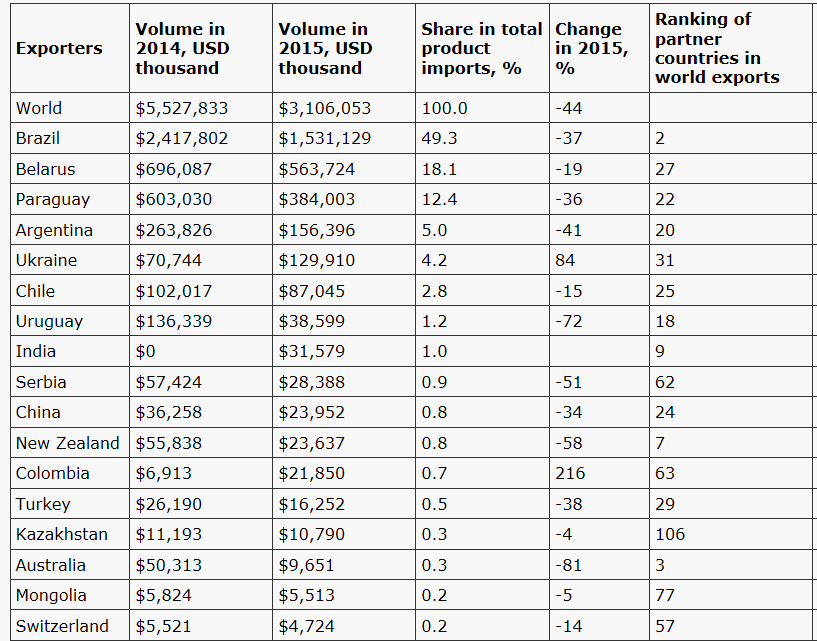
Source: http://www.rusexporter.com/research/industry/detail/4910/?sphrase_id=9602
As the table shows, NZ’s cut of the meat import market dropped from $55.9 million in 2014 to $23.6 million in 2015.
The corresponding NZ statistics for exports to Russia are for financial years ending September 30, and in NZ dollars (worth roughly 75% of one US dollar). The table shows the decline in Russian consumption of NZ meat was continuing through calendar year 2016. Rouble devaluation meant that NZ meat became significantly more expensive on the butcher-shop shelf; the contraction of Russian consumer income meant less money and demand to buy it. The decline was sharpest for beef; its export value fell by 75% over the past three years. Lamb and mutton dropped by 68%. Low-price beef products fell by 30%.
Altogether, the loss of sales income for NZ meat exporters is almost NZ$37 million (US$27 million at current exchange value).
In NZ’s export trade to Russia, dairy products, especially butter, rank first with a one-third share. This is followed by beef and lamb at 25%; fruit at 12%; fish also at 12%. A report for the September quarter of 2016 from Russian Customs shows that exports of dairy products gained 45% over the value in the same quarter of 2015. Meat, fruit and fish were all down.
As meat markets go for NZ exporters, Russia is too small to make the charts for beef or lamb. According to a NZ government source, “in 2016, beef and veal exports to Russia accounted for 0.2 percent of New Zealand’s total red meat exports.”
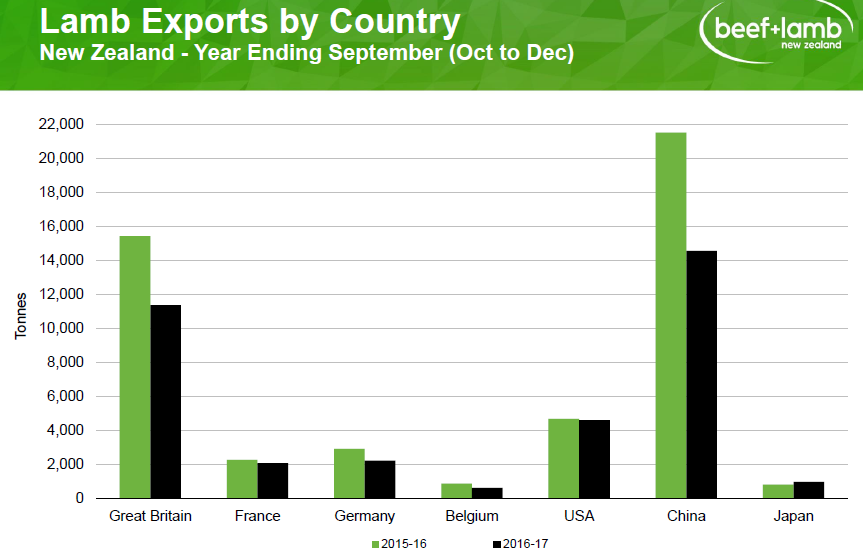
Source: http://www.beeflambnz.com/Documents/Information/Export%20lamb%20volume%20by%20country.pdf
Russia’s significance in NZ policy-making is more strategic and political than commercial. Since Key’s attack on Putin in September, New Zealand officials have taken one step forward, two steps backwards in their relationship with the Kremlin. At the end of October Foreign Minister McCully announced the successful conlusion of negotiations to finalize the boundaries of the Ross Sea Marine Protected Area in the Antarctic. Russian objections to the initial scheme proposed by NZ and the US can be followed here. According to McCully, it had been possible to negotiate with Russia, though he was dismissive of Russia’s initial objections and final concessions. “Every now and then you get lucky”, he told the press.
In November McCully reviewed NZ’s foreign policy interests in a speech to the local institute for international affairs. He started with an encouragement of nuclear-armed US warships to make portcalls to NZ for the first time in 33 years; nuclear arms and nuclear-propelled ships were banned by NZ in 1984. The following year French agents bombed a Greenpeace vessel protesting French nuclear warhead testing in the south Pacific.
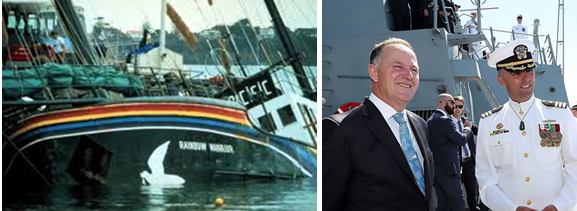
Left: Greenpeace’s Rainbow Warrior after the French attack, Auckland harbour, July 10, 1985; right: Prime Minister Key on board the USS Sampson, Auckland harbour, November 22, 2016. The Sampson is armed with Tomahawk cruise missiles which have nuclear warhead capability
According to McCully the US Navy portcall and a visit in the same month by then-Secretary of State John Kerry “symbolise the level of friendship, trust and mutual respect that today underpins NZ/US relations.” McCully didn’t mention Russia in his speech.
In December, McCully (right) followed a direction from the Obama Administration to introduce a UN Security Council (UNSC)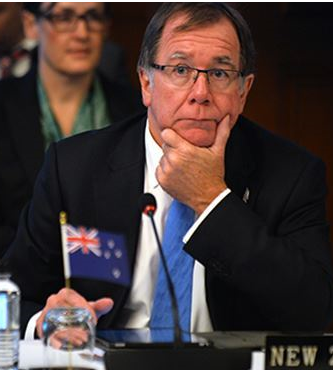 resolution aimed at curbing Russian support for the Syrian government in the Battle of Aleppo. The move was vetoed on December 6. McCully issued a press release calling Russia’s action “cynical and disappointing”. This was despite the recorded votes of China and Venezuela against the resolution, and Angola’s abstention. After the US, China is NZ’s most valuable trading partner, with two-way trade worth $23 billion in the year to June 30, 2016. “History will judge harshly those who have chosen to put power politics and technical excuses ahead of human life”, McCully declared. He did not mean China.
resolution aimed at curbing Russian support for the Syrian government in the Battle of Aleppo. The move was vetoed on December 6. McCully issued a press release calling Russia’s action “cynical and disappointing”. This was despite the recorded votes of China and Venezuela against the resolution, and Angola’s abstention. After the US, China is NZ’s most valuable trading partner, with two-way trade worth $23 billion in the year to June 30, 2016. “History will judge harshly those who have chosen to put power politics and technical excuses ahead of human life”, McCully declared. He did not mean China.
For the time being NZ’s defence strategy does not identify Russia as a direct threat, and is hanging on the coattails of the UK and Germany. According to the 2016 edition of the NZ Defence White Paper, “New Zealand shares Europe’s concerns about Russia’s intervention in Ukraine, including the annexation of Crimea, and the challenges this represents to the rules-based order which supports European peace and security.”
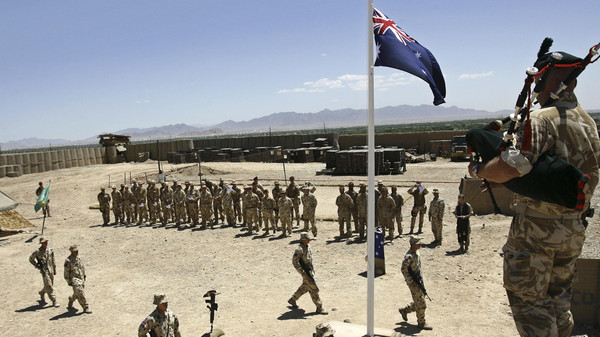
Camp Taji, north of Baghdad, Iraq 2015. Australian troops (on parade) were joined by a force of more than 100 NZ troops for a 2-year deployment, now extended for at least one more year. In August 2016 NZ Defence Minister Gerry Brownlee put at the top of his threat list “the resurgence of a more assertive Russia, the growing economic might of China and its emergence as a military big power.”
Novice prime minister English has had little to say about Russia in his five weeks in office. After his first official trip abroad last month – to London, Brussels and Berlin – English returned home to declare that NZ’s priorities abroad are, in English’s order: “the complexities and tensions building up in world politics – a newly assertive Russia and China, the ongoing refugee pressures around the Mediterranean, Brexit, a new US President and rising nationalism.”
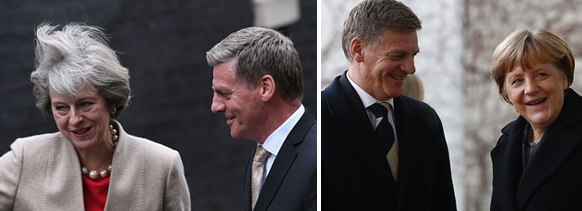
Left: English with UK Prime Minister Theresa May, January 13. Right: with German Chancellor Angela Merkel, January 16
Although English put Russia first and the US last on his list, most NZ sources acknowledge NZ’s trouble in the Russian market is small potatoes compared to the fear of what President Donald Trump’s proposed trade policies may do to NZ’s imports. Reported John Ballingall of the NZ Institute of Economic Research last year, “we exported $8.4 billion of goods and services there in CY2015, accounting for 12% of our total export revenue. Key products are beef ($1.6 billion), dairy ($1 billion), wine ($432 million), lamb ($288 million) and wood ($182 million), plus tourism (over 240,000 visitors). Despite Trump’s assurances about how ‘great’ or ‘terrific’ the economy will be under his watch, his policy prescriptions don’t warrant a great deal of optimism in our view…If Trump’s economic policies result in a slower-growing US economy, either directly through poorly designed interventions, or indirectly via a loss in investment or hiring intentions from nervous firms (again, à la Brexit), we would expect the demand for New Zealand’s exports to drop.”
The Ministry of Primary Industries in Wellington was asked to say what negotiations with RSN there have been since the October announcement in Moscow and yesterday’s ban announcement by RSN. Rachelle Linwood, the market access director at the ministry, replied: “New Zealand did not receive prior notification and officials are seeking further clarification about the announcement. The New Zealand Embassy is engaging relevant Russian authorities on this announcement, as a matter of urgency. Russian authorities enquired about ractopamine in 2012. New Zealand confirmed that ractopamine was not registered in New Zealand for use in beef animals. This still holds true.”
“New Zealand food standards are among the highest in the world and we are committed to producing high quality safe meat for domestic and overseas consumers. Regulatory issues arise from time to time in our trading relationships, and New Zealand officials work with the relevant authorities to resolve them.”


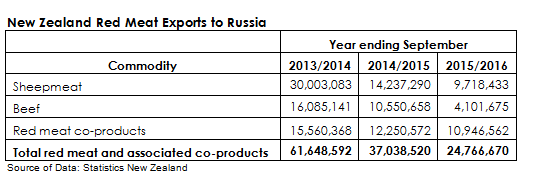
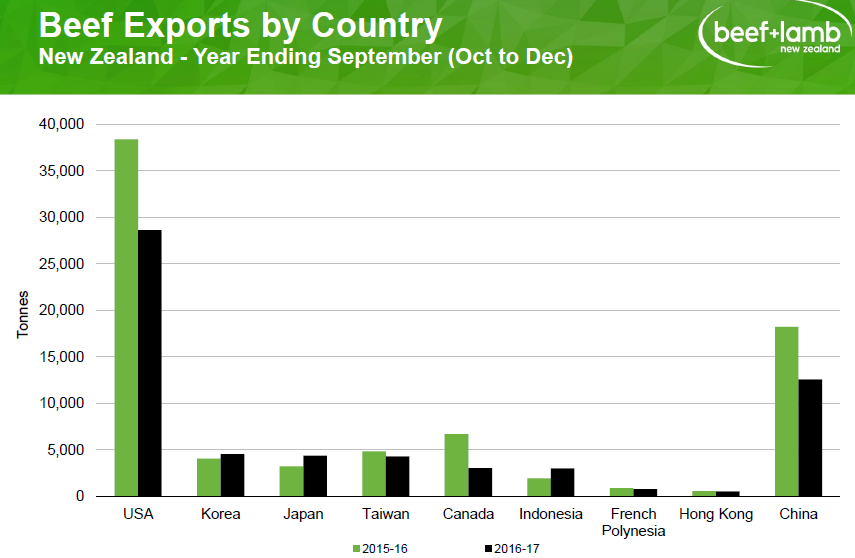










Leave a Reply